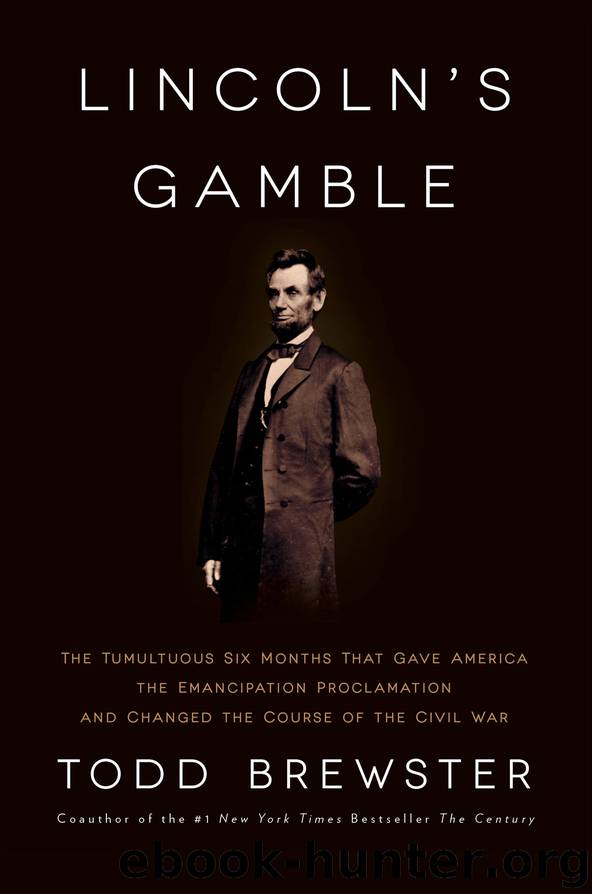Lincoln's Gamble by Todd Brewster

Author:Todd Brewster
Language: eng
Format: epub
Publisher: Scribner
XI.
WEAKENED
IT WOULD BE HARD to reconcile any of the many stalwart portrayals of Abraham Lincoln, anything from the pen of Carl Sandburg, say, or from the big-screen representations of Raymond Massey or Henry Fonda, from one of the many children’s books over the years, or from the big bold-print and worshipful images on posters taped to the walls of social studies classes across Kansas and Minnesota and Indiana, or, frankly, 90 percent of the biographies, especially those written in the seventy-five years or so after his death, but even many of the triumphant ones written today—it would be hard to reconcile any of these with the Abraham Lincoln who greeted December 1862.
Sure, Lincoln had issued the “preliminary” Emancipation Proclamation, and that had been met with something close to awe by all who had been waiting in earnest for the essential justice of this act, but besides the many legitimate critiques that inevitably followed from the reading of the document’s fine print, there was also, increasingly, the genuine worry that the proclamation—even this flawed proclamation—would never come to pass, that maybe Lincoln never intended it to come to pass, that he was posturing with the lives of 4 million, that he would yet find some way to deny them this revolutionary act, that he would deflect it, postpone it, amend and alter it, that he would knead the language that formed it until it no longer even resembled an act of emancipation. He was, after all, still caught between two seemingly incompatible constituencies, sitting at once on “two stools,” as one nineteenth-century historian described it, not so much balanced as poised to sprawl between them, and on which stool did he feel, in his heart, that he belonged?
The answer remained an enigma. Edward Stanly, the military governor of North Carolina (protecting Union-occupied territory along the coast), asked Lincoln to explain why he had defied his pledge, the one he made to Stanly, that he would only seek to restore the Union, not fight to end slavery now, a pledge that had convinced Stanly to stand up for Lincoln in an antagonistic Confederate state, and Lincoln reportedly responded by saying it had become “a civil necessity”—not a military necessity, but a civil necessity—to do so, for he had to “prevent the Radicals from openly embarrassing the government in the conduct of the war.” Lincoln anticipated that unless he issued a proclamation of freedom, the Republican Congress would use the power of the purse to stay his hand, to stop the war, “leaving the whole land in anarchy.” He had “prayed to the Almighty to save him from this necessity,” the president told Stanly. “If it be possible, let this cup pass from me,” he had said, quoting from the book of Matthew. But his prayer had gone unfulfilled.
If Stanly is to be believed (and this was reported not from his lips but by a journalist who met with Stanly and recorded it in his diary), then it was political blackmail, not the
Download
This site does not store any files on its server. We only index and link to content provided by other sites. Please contact the content providers to delete copyright contents if any and email us, we'll remove relevant links or contents immediately.
| Afghan & Iraq Wars | American Civil War |
| American Revolution | Vietnam War |
| World War I | World War II |
Waking Up in Heaven: A True Story of Brokenness, Heaven, and Life Again by McVea Crystal & Tresniowski Alex(37003)
Empire of the Sikhs by Patwant Singh(22171)
We're Going to Need More Wine by Gabrielle Union(18072)
Hans Sturm: A Soldier's Odyssey on the Eastern Front by Gordon Williamson(16616)
Leonardo da Vinci by Walter Isaacson(11901)
The Radium Girls by Kate Moore(10906)
Educated by Tara Westover(7061)
Tools of Titans by Timothy Ferriss(6945)
How to Be a Bawse: A Guide to Conquering Life by Lilly Singh(6692)
The Last Black Unicorn by Tiffany Haddish(5074)
Permanent Record by Edward Snowden(4996)
The Rise and Fall of Senator Joe McCarthy by James Cross Giblin(4843)
Promise Me, Dad by Joe Biden(4444)
The Wind in My Hair by Masih Alinejad(4424)
The Crown by Robert Lacey(4105)
A Higher Loyalty: Truth, Lies, and Leadership by James Comey(4031)
The Iron Duke by The Iron Duke(3639)
Joan of Arc by Mary Gordon(3257)
How to be Champion: My Autobiography by Sarah Millican(3185)
